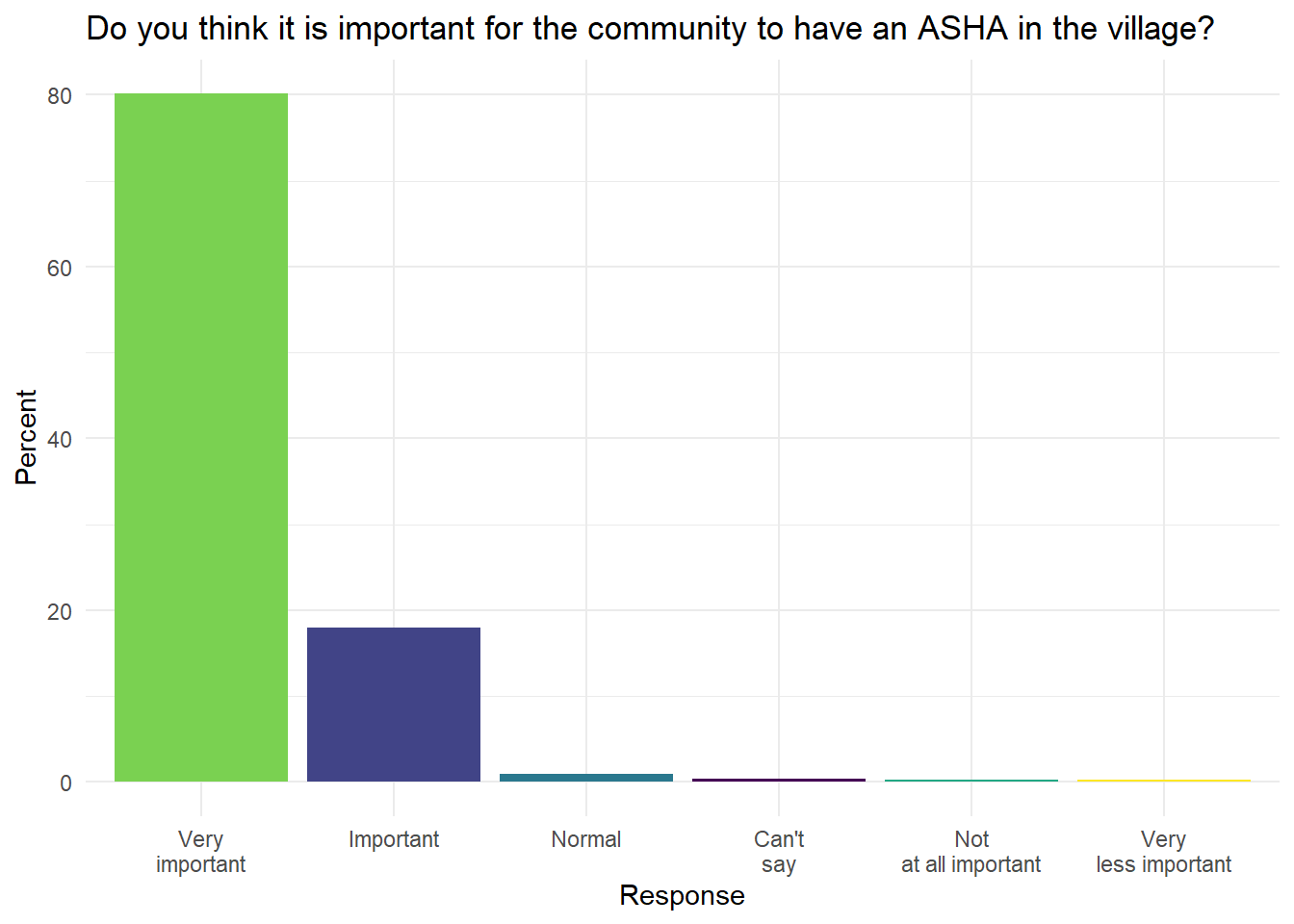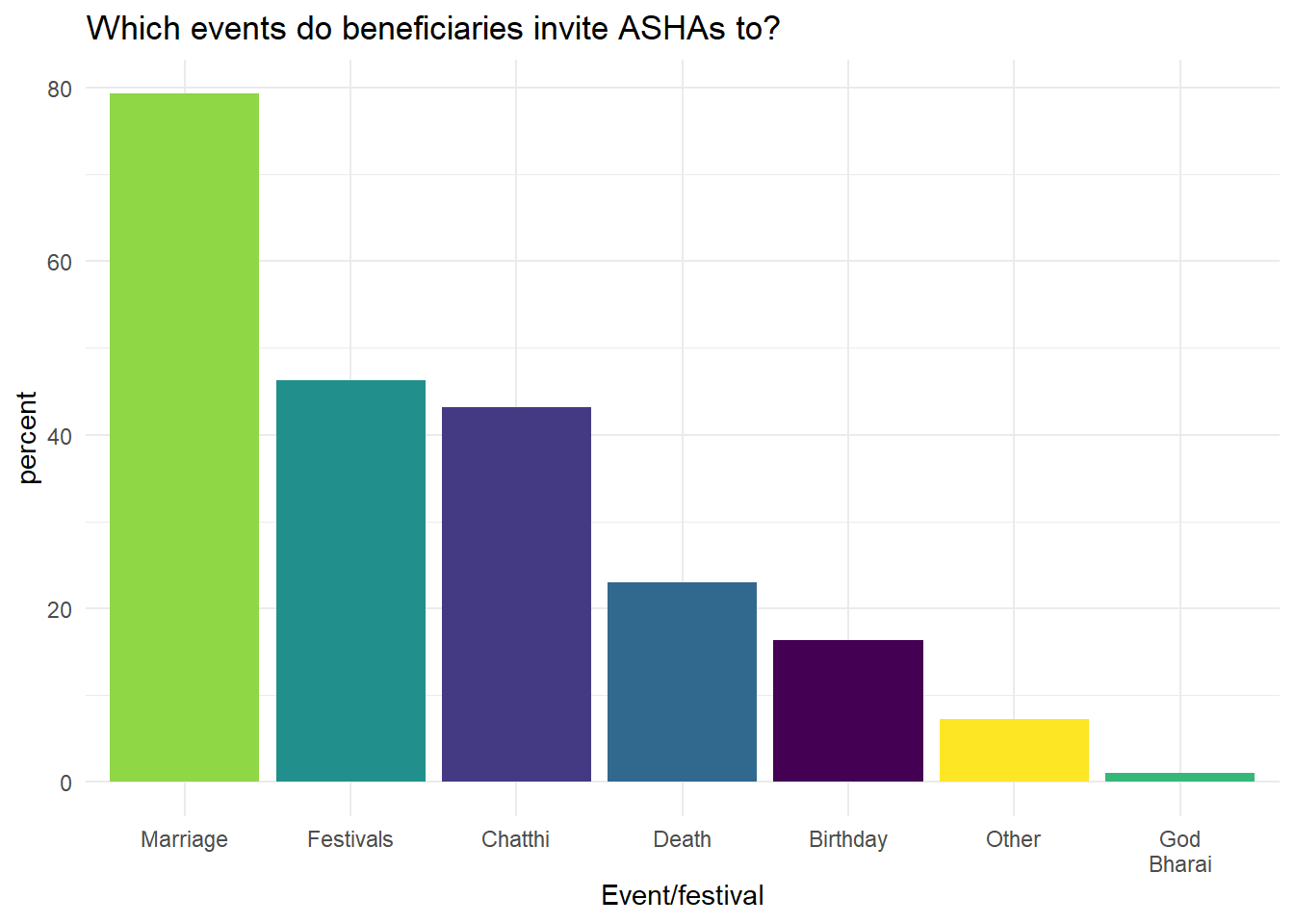6.4 Perception of ASHAs
The beneficiary community seems to have a positive attitude about ASHAs. For instance, one question asks if mothers think that ASHAs are generally respected in their communities; to which 92.58% said yes. Of the 21 who said ‘no’ to this question, the most common reason why was that the ASHA did not perform her duties well. Only one woman said that ASHAs ask for bribes.
Further, 71.9% said that ‘yes’ they would like someone in their family to become an ASHA. Of these women who said they want an ASHA family member, about 47% said this was because of incentives and about 41% said it was because the work is for a noble cause. This is a recurrent theme across Project RISE data streams, financial incentives and community service are both highly valued in the ASHA’s role.
Another question asks the mother if she would have more trust in advice from the Dai or the ASHA, to which 13.4% responded they’d trust the Dai more and 64.8% that they’d trust the ASHA more (17.3 % responded with ‘both’). This is an interesting result because, as we see below, there are cases where Dais and ASHAs have somewhat opposing influences on key health behaviors. Likewise, we know from the qualitative data that both figures are respected and valued, but that Dais are still seen as having a presence within the household, whereas ASHAs are somewhat external.
The majority of beneficiaries reported that they thought ASHAs were very important to their communities; 80% said ‘very important’ and 18% said ‘important’ (Figure 6.15).

Figure 6.15: Community perception of ASHA importance.
When also asked beneficiaries if they ever invite ASHAs to any social events, 41% said yes and 59% said no. Of those who said yes, we asked a followup question about which events ASHAs are invited to. Almost 80% of the 489 mothers who reported inviting ASHAs to events mentioned weddings as the event they invite ASHAs to (Figure 6.16). ASHAs are also fairly frequently invited to festivals and to Chhathi. The event most ‘in the household’ is God Bharai and ASHAs are pretty un-associated with this (but we don’t have an estimate for how many of the mothers sample practiced God Bharai).

Figure 6.16: The events that mothers invite ASHAs to (for the mothers who said they invite ASHAs to events)
ASHAs report generally positive responses when asked what they think others think of them. For instance, 310 of 400 ASHAs reported that they feel the community respects them to ‘a great extent’ (77.5%)
Further, most ASHAs report that their husbands and families are proud of them (Table 6.8).
| response | count | percent |
|---|---|---|
| To A Great Extent | 238 | 59.5 |
| Somewhat | 90 | 22.5 |
| Very Little | 28 | 7.0 |
| No Response | 24 | 6.0 |
| Not At All | 20 | 5.0 |
| response | count | percent |
|---|---|---|
| To A Great Extent | 249 | 62.3 |
| Somewhat | 94 | 23.5 |
| Not At All | 31 | 7.8 |
| Very Little | 26 | 6.5 |
From these descriptions we see that it is fairly common that ASHAs are present at weddings (a ritualized activity and an opportunity space for making a connection). There is also a great deal of respect for the ASHA among beneficiaries and ASHAs are even trusted more than Dais. ASHAs are socially active members of the community with their presence in a majority of socially celebrated events, which could present many opportunity areas to ritually strengthen ties between young women and ASHAs.